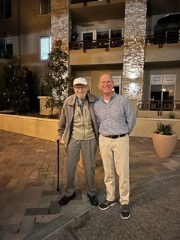By Skip Steward, Shingo Faculty Fellow
I have been a Shingo examiner since 2014 and have worked in a large healthcare system for the past ten years. But only in the past two-plus years have I realized that the Shingo Institute, and specifically the Shingo ModelTM, is “just what the doctor ordered” when it comes to the multitude of ills in healthcare. Most of my thirty-one-year career was spent in manufacturing and other industries, but I was introduced to the Shingo Institute and the Shingo Model when I entered healthcare with my present company. Ten years later, I continue learning about the great work that is being done throughout the world by the Shingo Institute and companies embracing the Shingo Model.
A little more than two years ago, I met and started a weekly cadence of coaching with Dr. Edgar (Ed) Schein and his son Peter Schein. I even had the honor of spending some time with the Scheins at their Palo Alto home in California. Dr. Schein was professor emeritus of the Massachusetts Institute of Technology (MIT) Sloan School of Management where he authored numerous books and papers while consulting for individuals and organizations around the globe. Recognized as a founder of the field of organizational studies, he published more than twenty books, most notably Organizational Psychology, Process Consultation, Organizational Culture and Leadership, Helping, and Humble Inquiry. Through their Organizational Culture and Leadership Institute, he and his son Peter, a strategy consultant in Silicon Valley, co-authored Corporate Culture Survival Guide, the second edition of Humble Inquiry as well as, posthumously, Humble Leadership and Career Anchors Reimagined with John Van Maanen.
Dr. Schein passed away in January 2023 and I am so grateful for the many things he taught me. We would have conversations on various topics like the psychology of group dynamics, humble inquiry, and culture. But I was especially thankful for our discussions on systemic thinking. He helped me realize at a profound level how healthcare is truly a complex socio-technical system that brings together people (social) and processes (technical) while arguing that it is also the most complex socio-technical system on the planet.
I have been interested in systems for a long time. I was a big fan of the late Dr. Russell Ackoff, a pioneer in system thinking, and enjoyed books from the Shingo Institute on this subject: Complex Management Systems and the Shingo Model and Enterprise Alignment and Results, and even coauthored a book myself, Creating an Effective Management System: Integrating Policy Deployment, TWI, and Kata, where we thoroughly reviewed the Shingo principle Think Systemically. But for some reason I did not really appreciate thinking about complex systems through the lens of a socio-technical element. I guess I primarily used the traditional machine-industrial-mental model, which is not adequate for today’s understanding of the role of people in systems.
If you examine how a patient travels through a hospital, you can see the complexities of multiple handoffs and all the interdependencies that exist in today’s healthcare system. Thinking systemically means looking at this travel through the eyes of the patient and seeking to remove the barriers that interrupt the smooth flow of the journey. In the fall of 2022, I had the privilege of speaking on this topic at Stanford University. After my presentation, I was joined onstage by Peter Schein and John Shook and, by video, with Dr. Ed Schein for a Q&A session. Quite a discussion developed about which was most important: the social or the technical. I thought John Shook’s response hit the nail on the head when he explained that they are like a double helix and not like two sets of pillars. If you try to separate the social from the technical, you have the challenge of trying to put them back together.
The more I study the Shingo Model and learn from others throughout the world how they are applying the Shingo Model, the more I realize that the model is truly a robust socio-technical systems model. I thought about this often during the various coaching sessions I had with Ed and Peter. Ed often expressed how, through his nearly seventy-year career, he would consistently find people getting “content seduced” with the technical while only giving lip service to the social. The Shingo Model captures the cultural enabling principles as the foundation for the ten Shingo Guiding Principles. If you look at the Shingo Guiding Principles, you can see that we do not have ten independent principles, but ten interdependent principles. Looking carefully at the Shingo Model, you see the interdependence between each element, with culture at the center. Healthcare needs a model like the Shingo Model, a socio-technical system that supports the complex interactions between people, technology, and processes, all of which must be included as we drive greater value for our patients.
Quite often people will talk about culture with very little context. I think the Shingo Model provides the context for the conversation. The Shingo Model also provides a significant countermeasure for the many pains of healthcare. So, when it comes to this extremely complex socio-technical system we call healthcare, I truly believe the Shingo Model is just what the doctor ordered.
Visit the Baptist Management System on YouTube and click on the videos tab to find four videos created with Dr. Edgar Schein and Peter Schein on culture and six additional videos created with Ed and Peter on humble inquiry.

Optional footer text. If none, Advanced > Layout > Display: None